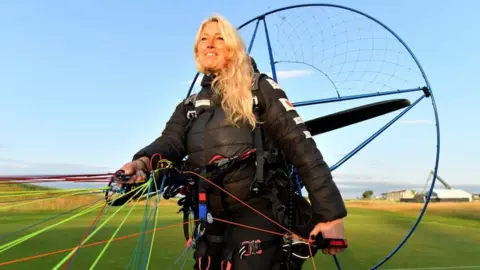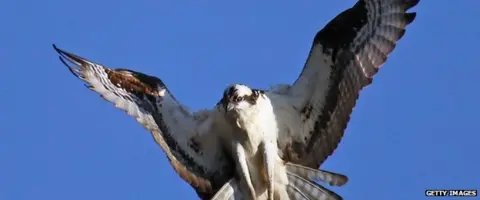'Human swan' Sacha Dench to return to skies after fatal crash which killed colleague
Less than a year after a fatal mid-air collision which left her seriously injured and a colleague killed, conservationist Sacha Dench is launching a new expedition to track the 6,000-mile migration route of ospreys from Scotland to west Africa.
Cameraman Dan Burton died when the pair's paramotors collided in the north west Highlands in September last year.
However, Ms Dench is determined to be part of the Flight of the Osprey expedition by Conservation Without Borders, which she founded.
She will make the 10,000km journey in August from Scotland to Ghana through 14 different countries.
The aim will be to gather data and highlight the impacts of climate change and human activities on the birds of prey and other wildlife, after the original trip in 2020 was postponed due to Covid.
Ms Dench, dubbed "the human swan", is not yet able to fly following the paramotor accident which left her with life-changing injuries, which she is still recovering from nine months later.
 PA Media
PA Media"I won't be flying an aircraft, I'm not at that point yet in my recovery," Ms Dench told BBC's Good Morning Scotland.
"Thanks to the NHS, the staff in Inverness and Aberdeen have done amazing work with my legs, but I've still got a frame on my left leg so I'm not able to fly the next route.
"But, part of my rehabilitation is going to be getting in the water and I will be able to free dive again so the osprey, being a bird of prey relying on healthy forest and fresh water, means we're going to have to investigate under water all along the expedition route as well."
The Australian-born biologist was attempting a world-first circumnavigation of mainland Britain in a paraglider powered with an electric engine last year when tragedy struck.
The new expedition will focus on the threat ospreys and other wildlife, habitats and people face from climate change and human activities - including power lines, overfishing, plastic waste and fishing debris.
She said a recent report by the UN science body, the Intergovernmental Panel on Climate Change, had highlighted that climate change and human activity is causing widespread disruption and affecting the balance of nature.
"This expedition has been planned for a few years now," said Ms Dench.
"The Osprey has been making a comeback in Scotland and that's now spreading across the rest of the UK, but we've now got to look at all of the different countries on the migration route, all the different threats there are along the way, if we want the population to really bounce back.
"It's a project that has a lot of support. We've got partners all through Africa that really want to make this happen, we really want to find out what to do for this bird. And there are 300-400,000 people currently watching the ospreys cams online looking at the fate of those few birds in this country.
"Of the young birds who head off on migration, about 70% of them will never return, so there's a lot of people rooting for this project to happen.
"There are risks in any expedition but between here and Ghana we've got amazing partners along the way. It's really really sad that we lost Dan Burton last year but we're doing the expedition as much for him as for anything else, as well as all the partners."
 Getty Images
Getty ImagesWhy follow Ospreys?
Ospreys were once common across Europe, but the bird was driven to extinction in many places - including Britain - in the 1800s.
They have now been reintroduced and thanks to conservation efforts are making a comeback in some places.
In Scotland, in particular, experts have had success by protecting nests and encouraging the public to support the birds.
From just one breeding pair in Scotland in the 1950s, there are now around 250 breeding pairs across the UK, although Ms Dench was keen to point out "it should be closer to 2500".
How ospreys know the direction to go on the journey, and how young birds manage to make the journey on their own at such a young age, is still a mystery.
